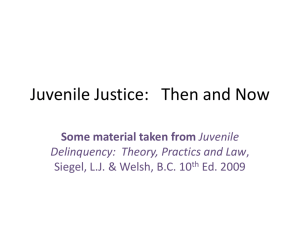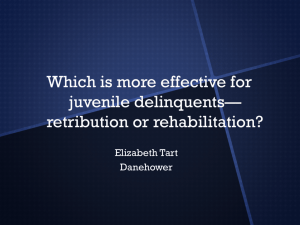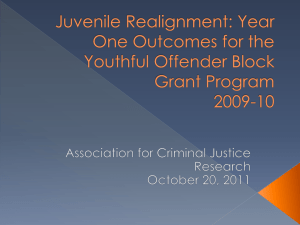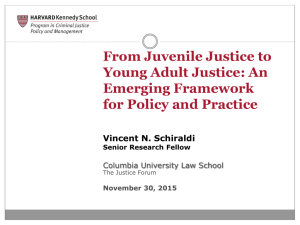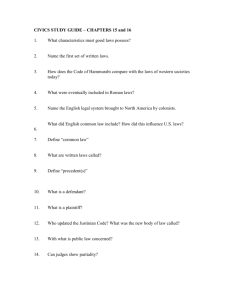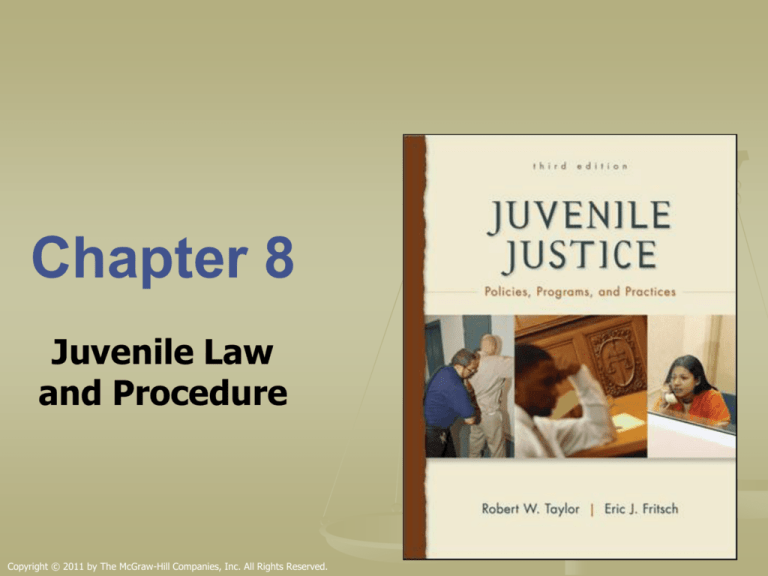
Chapter 8
Juvenile Law
and Procedure
Copyright © 2011 by The McGraw-Hill Companies, Inc. All Rights Reserved.
Chapter Outline
The Development of Juvenile Law and
Procedures
Early Juvenile Law
Landmark U.S. Supreme Court Cases in
Juvenile Justice
I.
II.
III.
D.
Kent v. United States
In re Gault
In re Winship
McKeiver v. Pennsylvania
E.
Impact of the Landmark Cases
A.
B.
C.
Copyright © 2011 by The McGraw-Hill Companies, Inc. All Rights Reserved.
Chapter Outline Continued
Issues in Juvenile Law
IV.
A.
B.
C.
D.
E.
F.
G.
H.
Juvenile Waiver of Rights
Juvenile Right to counsel
Search and Seizure
Interrogations and Confessions
Juvenile Proceedings
Juvenile Records
Bail
Detention
Copyright © 2011 by The McGraw-Hill Companies, Inc. All Rights Reserved.
Chapter Outline Continued
A.
B.
C.
D.
E.
F.
V.
Juvenile Right to Jury Trial
Juvenile Correctional Law
Right to Treatment
Juvenile Rights at School
Victims’ Rights in Juvenile Justice
Curfew Laws
Adult Criminal Trials versus Juvenile
Adjudicatory Proceedings
Copyright © 2011 by The McGraw-Hill Companies, Inc. All Rights Reserved.
Development of Juvenile Law
and Procedures
Hands-off approach – the idea that day-to-day
operations of the juvenile justice system should
be left up to the professionals working in the
system without court review or intervention.
Due process revolution – period of time during
the 1960s and early 1970s when the Supreme
Court made several rulings that created or
applied additional due process protections to
criminal justice.
Medical Model – the basic philosophy behind the
creation of the juvenile court, which involved
treatment of the offender.
Copyright © 2011 by The McGraw-Hill Companies, Inc. All Rights Reserved.
Development of Juvenile Law
and Procedures Continued
Civil nature of juvenile proceedings – the
juvenile court was operated and proceeded
similarly to a civil court rather than a criminal
court.
Procedural Rights – rights that govern the
process by which a hearing or court action will
proceed.
Substantive Rights – rights that protect an
individual against arbitrary and unreasonable
actions.
Copyright © 2011 by The McGraw-Hill Companies, Inc. All Rights Reserved.
Early Juvenile Law
Juveniles were:
Arrested without warrant or cause
Interrogated by police at length without
parental notification or legal counsel
Were not advised of any rights
Were incarcerated for lengthy periods at
the whim of a juvenile court judge
Copyright © 2011 by The McGraw-Hill Companies, Inc. All Rights Reserved.
Kent v. U.S.
Arrested for burglary, robbery, and rape.
Waived to adult court.
Issue: was Kent entitled to due process in
the criminal justice system?
Decision: First U.S. Supreme Court case to
rule that juveniles facing waiver to adult
court are entitled to due process rights.
Copyright © 2011 by The McGraw-Hill Companies, Inc. All Rights Reserved.
In re Gault
Issue: Does a juvenile have due process
rights during the adjudication stage of a
delinquency proceeding?
Decision: Gault was granted rights to
Reasonable notice of the charges
Counsel as well as appointed counsel if
indigent
Confront and cross examine witnesses
Against self-incrimination, including the right
to remain silent
Copyright © 2011 by The McGraw-Hill Companies, Inc. All Rights Reserved.
In re Winship
Supreme Court decided the standard of proof in
juvenile delinquency proceedings is proof
beyond a reasonable doubt.
Proof beyond a reasonable doubt – the facts and
evidence are entirely convincing and satisfy that
the person committed the act beyond any
reasonable doubt.
Preponderance of the evidence – evidence that
is of greater weight or more convincing than
evidence that is offered in opposition to it.
Sometimes referred to as more than 50%.
Copyright © 2011 by The McGraw-Hill Companies, Inc. All Rights Reserved.
McKeiver v. Pennsylvania
U.S. Supreme Court case in which it was ruled
that juveniles are not entitled to trial by jury in
delinquency proceedings.
Reasons to deny the right to a jury trial:
1.
2.
3.
4.
Juveniles are already protected enough through
prior decisions
Jury trials would end informal, protective
proceedings
Jury trials would not strengthen the fact-finding
function of the juvenile court
Jury trials would end the distinction between the
criminal and juvenile systems
Copyright © 2011 by The McGraw-Hill Companies, Inc. All Rights Reserved.
Breed v. Jones
The U.S. Supreme Court ruled that
juveniles are protected against double
jeopardy by the 6th Amendment to the
U.S. Constitution.
This means that a juvenile could not be
tried in a juvenile court and then tried
again in an adult court for the same
offense.
Copyright © 2011 by The McGraw-Hill Companies, Inc. All Rights Reserved.
Fare v. Michael C.
The Supreme Court case that established ground
rules for determining whether a juvenile has
knowingly and voluntarily waived his or her
rights.
The Court had to decide under what
circumstances a juvenile, without consulting a
parent, attorney, or other interested adult, can
make an intelligent, understanding, and
voluntary waiver of his rights.
The Court applied the totality of circumstances
approach as the standard applicable to juveniles.
Copyright © 2011 by The McGraw-Hill Companies, Inc. All Rights Reserved.
Problems Facing Public
Defenders in Juvenile Court
Annual caseloads of more than 500 cases.
Lack of resources for independent evaluations,
expert witnesses, and investigatory support.
Lack of computers, telephones, files, and adequate
office space.
Inexperience, lack of training,
low morale, and low salaries.
Inability to keep up with
rapidly changing juvenile
codes.
Copyright © 2011 by The McGraw-Hill Companies, Inc. All Rights Reserved.
New Jersey v. T.L.O.
The Supreme Court decision that school
officials only need reasonable grounds,
not probable cause, to search a student
when they suspect that the search will
turn up illegal evidence.
The Court ruled that school officials do not
have to have a warrant to justify a search.
Copyright © 2011 by The McGraw-Hill Companies, Inc. All Rights Reserved.

